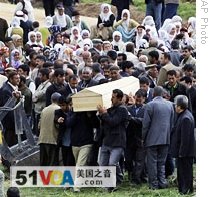Istanbul
08 May 2009
The recent massacre of a wedding party in southeast Turkey has cast the spotlight on the region's local militia known as Village Guards. Some of the weapons used in the wedding attack are believed to belong to the militia. The militia was created by the government in its battle against the Kurdistan workers party (PKK). But human rights groups have accused the militia of abuses and criminal activity. With most of the PKK being forced out of Turkey into neighboring Iraq, and peace returning to much of the region, calls are growing for the militia to be disbanded.
 |
| People bear the coffin of a victim of Monday night's assault to bury in Bilge in southeastern Turkey, 05 May 2009 |
Analysts say the "Village Guards" militia is the key support element for the Turkish army in its war against the PKK. But with most of the PKK insurgents now forced into neighboring Iraq, peace has returned to much of the Kurdish region.
For guards like Ali Can from the southeast city of Diyarbakir the concern is now for the future.
Can says he has been fighting for the Turkish state since 1985, but since the fighting has subsided he has nothing to do. He said he gave up everything to join the guards and risked his life for the state, but he has received nothing from government in return.
Calls for the abolition of the Village Guards has been growing in Turkey. Some human rights groups say coercion was widely used by the government to test the loyalty of the local Kurdish population. But the Village Guards have also been accused of human rights violations. The European Union, which Turkey is bidding to join, has also called for the abolition of militia.
Turkish authorities say they believe the Village Guards played a role in the recent massacre of 44 people at a wedding party in Southeast Turkey. Interior Minister Besir Atalay told reporters he suspected Village Guards were involved in the attack.
Atalay said one sad dimension of the event is the involvement of the Village Guards, and this is an important aspect of the matter for the government.
Ahmet Turk, the leader of the country's main pro-Kurdish Democratic Society Party, said the massacre was a result of the state arming thousands of people.
Turkish Deputy Prime minister Cemil Cicek said disbandment was now under consideration, but added the decision should not be taken in haste.
But disbanding the militia is not an easy job for the government, according to Dr. Kemal Kirisci, a political scientist at Bosporus University. He says the problem is not securing support to end the guards, but rather how to achieve it.
"There has already been quite a lot of talk in state circles that the village guard system needs to be disbanded," he said. "I think there is a consensus on this too, amongst political parties and I suspect also in the national security council. The problem is how do you dismantle the system, with as little economic damage to the 60,000 Village Guards and their families have been incorporated into the system and how do you rebuild the big bridges between those Kurds who served in the Village Guards and those who refused to serve and who faced the consequences of refusing to serve."
Members of the local militia are usually members powerful local clans, which wield considerable power in the region. There are also numerous reports that some of the guards are linked to illegal activities, including narcotic smuggling and organized crime. But the growing scrutiny of the village guard system is fueling calls for its disbandment.
Guard member Abdullah Guc from the city of Diyarbakir has a warning to the government.
He said he left school to join the Village Guards and for 12 years he has been fighting for the Turkish state. If the government does not want the guards anymore, the authorities cannot just stop paying the guards and expect them to give up their guns.
Some political commentators in Turkey have described the village guard system as a self-created monster of the Turkish state.
They say the problem now is what to do with it.